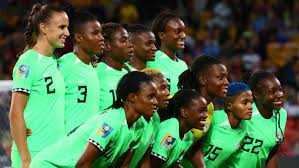August 9 – World players union Fifpro has stepped in to help the Super Falcons of Nigeria in their pay dispute with the Nigeria Football Federation (NFF) to pay wages as well as Women’s World Cup prize money. The NFF called Fifpro’s intervention a “storm in a teacup.”
The Nigerian women enjoyed an outstanding Women’s World Cup, reaching the last 16 and only exited after a tense and tight draw with England before losing 4-2 on penalties. But those achievements seem to matter little to the NFF.
Before the finals, manager Randy Waldrum claimed he was owed seven months’ wages. Some players have reportedly not been paid in two years.
In a statement, Fifpro said it is assisting players in a disagreement with the Nigeria Football Federation concerning bonus payments, camp allowances and expenses, some of which date back to 2021.
“During the World Cup, the players expressed the desire to remain focused on their performance without making public statements or facing other distractions.
“However, the Super Falcons believe that it is now time for the Nigeria Football Federation to honour their commitments and pay the outstanding amounts.”
Nigeria forward Ifeoma Onumonu has said that the squad had no access to a gym in their training camp in Nigeria and that the players were forced to share beds.
“The team is extremely frustrated that they have had to pursue the Nigeria Football Federation for these payments before and during the tournament and may have to continue doing so afterwards,” said Fifpro. “It is regrettable that players needed to challenge their own federation at such an important time in their careers.”
On Twitter, Nigerian forward Victor Osimhen waded in saying: ‘Pay them, NFF.’
The NFF have however blasted Fifpro, dismissing the organisation’s statement “as nothing more than a storm in a teacup” and “a relevance-seeking message”.
“It recalled that its officials sat down and agreed with the players on what to pay them, but FIFA came up with a juicier package and they were all happy about it,” said the NFF in a statement.
“The NFF also charges Fifpro to stop playing the ostrich and stand up to its real responsibilities calling on the body to address the real issues. The Federation revealed that after all these years, Fifpro does not have an affiliate body in Nigeria.”
A week before the Women’s World Cup, FIFA’s head of women’s football Sarai Bareman wrote to the NFF to clarify the distribution model of tournament funding, outlining the difference between the Participating Member Association (PMA) allocation and the player prize money allocation.
“FIFA very much regrets reports that this effort has been opportunistically undermined by certain factions within your country to the contrary. Despite this situation, we trust entirely in the continued commitment of Nigeria Football Federation to continue to deliver progress in developing women’s football, including at the elite level despite these efforts by third parties,” wrote Bareman.
Days later, FIFA president Gianni Infantino said that his organization could not guarantee the direct distribution of prize money to players participating in the tournament after committing to a $110 million prize pool for the tournament.
“We have issued recommendations but we are an association of associations,” said Infantino. “So whatever payments we do will be through the associations, and then the associations will make the relevant payments to their own players.”
Contact the writer of this story at moc.l1745055910labto1745055910ofdlr1745055910owedi1745055910sni@i1745055910tnuk.1745055910ardni1745055910mas1745055910

